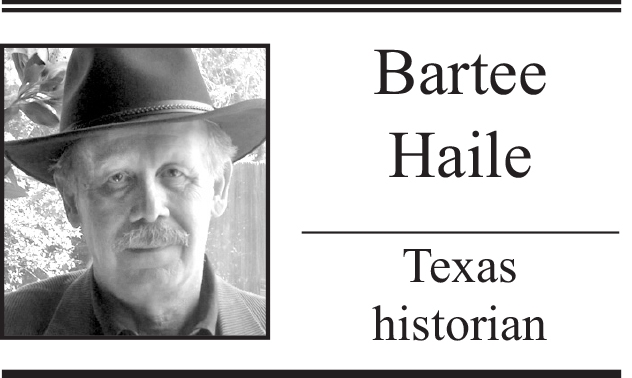This Week in Texas History

Disgraced politician tries to settle the score
Mar. 14, 1882, was the date and the Dallas County Courthouse was the place a former mayor of three Texas towns chose to have it out with the man he blamed for his latest fall from political grace.
It was no coincidence that James Thurmond went out west in the late 1850s. Like other youths of draft age, the Kentucky native wanted to put as many miles as possible between him and the soon-to-come Civil War.
During the day, Thurmond taught school in a California classroom and at night he studied for the bar exam. When he moved to the Alder Gulch mining region in the Idaho Territory in 1862, he was a licensed lawyer.
Thurmond quickly earned a reputation as the best defense attorney money could buy. According to one biographer, he was “famous for his shrewd nature, his extraordinary legal talent and his ability to consistently obtain acquittals for known outlaws.”
The legal eagle was so good that a gang of bandits put him on retainer. His success on behalf of his cutthroat clients angered the local vigilance committee, a secret group of private citizens with a nasty habit of taking the law into their hands
Ironically the case that led to Thurmond’s hasty departure from the territory was one of the few he lost. In December 1863, he defended an alleged member of the gang accused of killing a prospector for his precious metal and mules. The fact that Thurmond was falling down drunk during his incoherent closing argument undoubtedly influenced the outcome, and the doomed defendant was hanged minutes after the guilty verdict.
Even though the vigilantes could not have been happier with the result, they were determined not to let Thurmond twist another jury around his little finger. Given 15 minutes to clear out, he was packed and gone with time to spare.
The exile hung around Salt Lake City for the next four years waiting in vain for the opportunity to take his revenge but finally headed back east in search of a fresh start. Thurmond ended up in Bryan, Texas, where as usual he made a great first impression. “People liked him,” wrote the aforementioned chronicler. “He was a man of taste, complete with suit, bowler hat, cigar and walking stick. Most folks apparently overlooked his violent temper and his end-justifies-the-means ethics.”
Thurmond ingratiated himself so effectively with the carpetbagger crowd that Gov. Edmund J. Davis appointed him Brazos County judge and mayor of Bryan in late 1869. He held the second post just two months and left the bench not long after that, when Radical Republicans began to question his commitment to Reconstruction.
Thurmond showed up a few months later in Groesbeck, a recently incorporated community in the Central Texas county of Limestone. He made so many friends and influenced so many voters that he was elected mayor. But the scoundrel swiftly wore out his welcome and was removed from office in April 1872 after serving a mere 55 days.
The next stop on Thurmond’s tour of Texas was Dallas, not yet “Big D” but well on its way to becoming the sixth largest town in the Lone Star State in the census of 1880. With his incomparable legal skills and irresistible charm, the enigmatic newcomer soon had nearly everyone eating out of the palm of his hand.
Thurmond took a break from his busy law practice to run for mayor in 1879. He proved to be the people’s choice but not that of the city council, which sought his ouster because of his “identification with the gamblers and other criminal elements.”
The embattled mayor refused to go down without a fight but succeeded only in postponing the inevitable, which came in August 1880. He asked the voters for vindication but lost his appeal at the polls.
Thurmond blamed his downfall on Robert E. Cowart, chief attorney in the council campaign to kick him out of office and an outspoken opponent of his reelection bid. This time Thurmond would not leave town. He would get even.
The two mortal enemies bumped into each other in an empty courtroom in March 1882. “You haven’t got the nerve to do it,” Thurmond growled. Infuriated by Cowart’s silence, he roared, “When you commence to talk shotguns to me, you have struck the wrong man. I am always ready. You have slandered me and my family.”
The lone eyewitness reported, “I was watching Thurmond. His face was livid. I had my hand on his shoulder and was telling him he must not fight there. Thurmond delayed only a moment and then said, ‘Now is as good a time to settle it as any.’”
The ex-mayor reached into his coat pocket and shouted, “Damn you! Draw it! I am ready for you!” Cowart leapt to his feet, pulled his pistol and fired.
The bullet struck Thurmond in the forehead. He fell dead to the floor with his trademark hat still on his head, a cigar in his mouth and a loaded revolver in his right hand.
The obituary in the Dallas Herald praised the slain lawyer-politician for his “powerful combativeness” and added he “was never happier than when in the midst of strong opposition.” If that was true, James Thurmond must have died a mighty happy man.
Bartee’s three books and “Best of This Week in Texas History” column collections are available at www.barteehaile.com.

